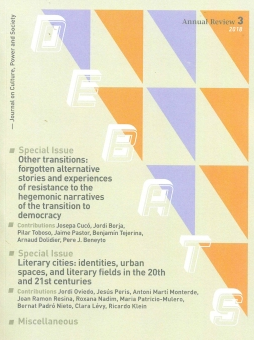Social movements in the political transition: inheritances, singularities, and transformations of social mobilisation in the 1970s
Abstract
The objective of this article is to analyse the characteristics of social mobilisation during the democratic transition in Spain in the late 1970s. Beyond the unequal silence that regarding the roles played by different social movements in shaping the configuration of the political and social system at that time, the recovery of some viewpoints that provide visibility to the contribution of social movements to political and social change, is also valuable. Specifically, the transmission of heritage, the processes of relief among activists, and the peculiarities of these activities, which have had several consequences lasting many decades. Secondary sources and the testimonies of numerous anti-nuclear, feminist, nationalist, linguistic, pacifist, and neighbourhood activists from various research projects were used. Far from a nostalgic review, the results reveal the complex relationships between political parties—especially those on the left—and social movements. The most visible traces of these connexions are those that put an end to the silence manufactured by the Francoist regime, that led the collective effervescence into the streets and public spaces, enabled diversification, specialisation, and socialisation of a new generation of activists, and produced relative deradicalisation and professionalisation which brought about legal reforms and further social change, as well as the institutionalisation of social movements.Downloads
Downloads
Published
How to Cite
Issue
Section
License
Without prejudice to the provisions of article 52 of Spanish Law 22/1987 of November 11 on Intellectual Property, BOE (official state bulletin) of November 17, 1987, and pursuant to said legislation, the author(s) surrender(s) free of charge its rights of edition, publication, distribution and sale of the article, for its publication in Debats. Journal on Culture, Power and Society.
Debats. Journal on Culture, Power and Society is published under the Creative Commons license system in accordance with the «Recognition - Non-Commercial (by-nc) modality: The generation of derivative works is permitted provided that commercial use is not made. Nor can the original work be used for commercial purposes».
Thus, when the author submits his/her contribution, he/she explicitly accepts this assignment of publishing and publishing rights. Authors also authorize Debats. Journal on Culture, Power and Society to include their work in an issue of the journal to be distributed and sold.











